MISSISSIPPI
Adelaide-Melbourne 1972-75
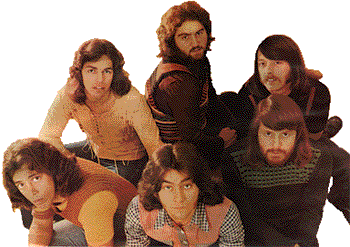 |
Beeb Birtles (vocals, guitar) 1972-75
Colin Deluca (bass) 1972-73
Graeham Goble (vocals, guitar) 1973-75
Russ Johnson (vocals, guitar) 1972-73
Peter Martin (guitar) 1973-75
John Mower (vocals) 1972-73
Derek Pellici (drums) 1973-75
Andre Santos (bass, vocals) 1973
Kerryn Tolhurst (vocals, guitar) 1973
Charlie Tumahai (bass, vocals) 1973-75
Ted Van Zyl (drums) (session) 1972
|
History
Mississippi evolved from Adelaide folk-rock band called Alison Gros, a trio
consisting of Graeham Goble, Russ Johnson and John Mower. Alison Gros
recorded one independent single ("Naturally" / "Would You Really
Have To Go?") on the Gamba
label in 1970. The band then moved to Melbourne and signed to Ron
Tudor's Fable
Records, for whom they cut two more singles in 1971, "If I Ask
You" / "So
Good" (July) and "All The Days" / "Weaver Of Life" (December).
Their next recordings for Fable is a
genuine oddity of Australian rock. Under the pseudonym Drummond, the members of Alison Gros cut a novelty
'chipmunk' versions of the '50s rock'n'roll
classic "Daddy Cool", which was released in July '71. It was a
shameless cash-in on the success of Ross Wilson's new band Daddy Cool, whose own version
of that song was included on Daddy Cool's hugely
successful debut album.
Riding in on the coattails of DC's chart breakthrough, the
Drummond version of the song actually knocked Daddy Cool's huge #1 hit
"Eagle Rock" off the top of the charts and, inexplicably, became one of
the biggest hits of the year, charting for 22 weeks (a fact Ross Wilson
sarcastically referred to when introducing the song during Daddy Cool's
farewell concert in 1972, captured on DC's The Last Drive-In
Movie
album). Fable went on to release three more singles under the Drummond
pseudonym, but these were apparently recorded by anonymous studio
musicians and the members of Alison Gros were not involved.
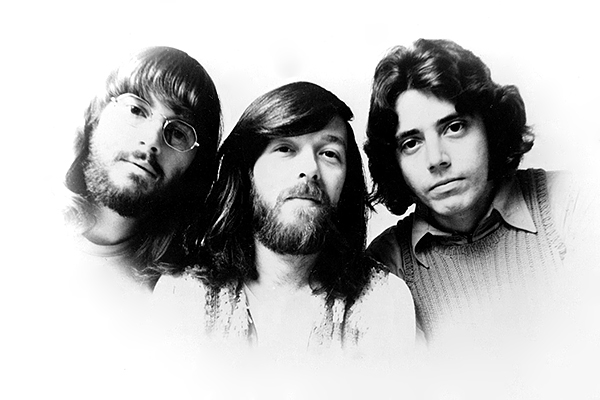
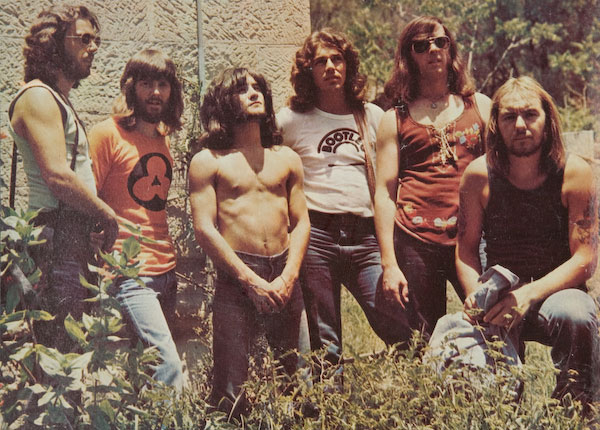
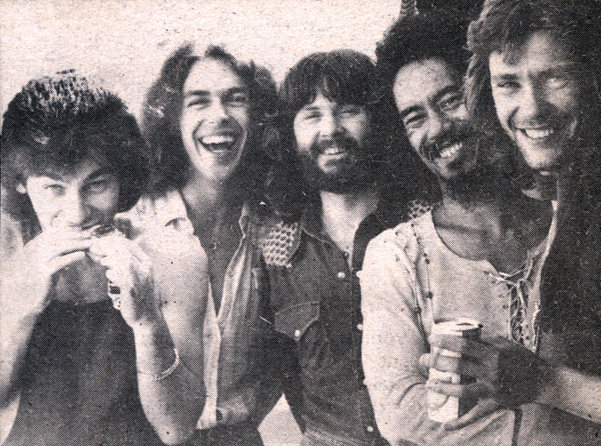
LEFT: the original trio incarnation of Mississippi (L-R) Graeham Goble, John Mower, Russ Johnson.
CENTRE: Mississippi in 1972 (L-R) Johnson, Goble, Derek Pellici, Beeb Birtles, Mower, Colin Deluca
RIGHT: Mississippi 1973-74 (LR) Pellici, Birtles, Goble, Charlie Tumahai, Harvey James
In early 1972, Alison Gros changed their name to Mississippi. They
recorded their excellent self-titled debut LP with the addition of
session players Peter Jones (piano), Geoff Cox (drums), Barry Sullivan
(bass, ex-Chain) and Graham Lyall (flute). It was released in September
that year on Fable's new Bootleg
imprint, a subsidiary label recently set by Tudor and musician Brian
Cadd. The Mississippi album showcased the
band's considerable vocal abilities and Goble and Johnson's strong
writing skills. The material and the tight harmonizing showed the
influence of groups like The Hollies, The Bee Gees, Crosby and Stills,
Nash & Young. Their debut single "Kings
of the World" (released in July) became a Top 10 hit in
October.
With their album and single now critical and commerical
successes, the band decided to begin touring in support of the LP in
late '72. Needing a singer and bass player for the touring band,
Graeham Goble decided to contact Beeb Birtles, formerly bassist with Zoot), whom he knew from his
Adelaide days. After Zoot split, Beeb had formed a shortlived duo
called Frieze with Daryl Cotton. After that
project folded he went to work for the AMBO booking agency, and it was
here that he got a call one day from Graeham Goble.
When they met, Goble played the new LP to Beeb, and he was
knocked out by what he heard; Goble in turn was greatly impressed by
Birtles' ability. Although Beeb had by then switched from bass to
guitar, Gobles invited him to join the band. According to Birtles, the
rest of the band objected, but Goble threatened to quit unless Birtles
was hired. Beeb bought a new bass and auditioned with the group, but
the lineup was completed first by an unknown bassist (who was soon
replaced by
Colin Deleuca, ex-Fugitives), and drummer,
Derek Pellici (ex The Ash). In December '72
they issued a second single, "Mr
Moondog" / "All Through The Day". One of the group's important
early appearances was their set at the 1973 Sunbury Rock Festival in
January, where they were backed by a full orchestra. Graeham Goble has
assisdously kept a diary throughout his career (now totalling over 1900
live performances!) and happily this means he has a virtually complete
record of all Mississippi's live gigs, which can be viewed on the
Live Shows page of his official website. Over
the next two years Mississippi worked solidly in pubs,
clubs and discos all over the country, and although they
never achieved the
commerical success they deserved, it was a formative period for Graeham
Goble, who wrote and first performed many of the songs that he later
recorded with such success with LRB, including "It's A Long Way
There".
There were several more lineup changes,
beginning in February 1973 when Russ Johnson left to join Country Radio; he was
replaced for a month by Kerryn Tolhurst (who had
himself just left Country Radio). When Tolhurst left to form The Dingoes he was replaced by
Harvey James. Their next single, "Early Morning" /
"Sweet World" was released in July '73, and in October they
supported The Jackson Five
on their Australian tour. When the tour ended, Deleuca and Mower both
left the band. Deluca was replaced first by bassist Andre Santos, then
by Charlie Tumahai (ex-
Healing Force, Chain,
Friends) in December.
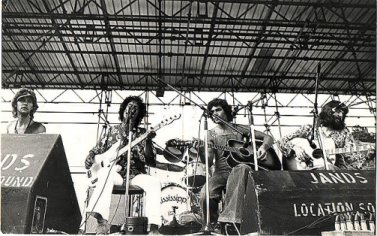 Right: Mississippi in action at Sunbury in 1974. (L-R) Harvey James, Charlie Tumahai, Beeb Birtles, Graeham Goble.
Right: Mississippi in action at Sunbury in 1974. (L-R) Harvey James, Charlie Tumahai, Beeb Birtles, Graeham Goble.
The band made their second appearance at Sunbury in January
1974. Regrettably, they never got the opportunity to record another
album but they were able to cut two more fine singles. Their
penultimate single, "Early Morning" was co-written by
Russ, Graeham and Beeb. The last single was a recording of a live
favourite "Will I", a song Beeb had co-written with
Daryl Cotton just after the demise of Zoot; its B-side, "Where
In The World" was the very first collaboration between Beeb
and Graeham. It was released in early 1974, and made the Top 40 in May
1974. According to Birtles, the band was disappointed by the lack of
support in Australia, and encouraged by interest in the album, which
had been released overseas, they decided to try their luck elsewhere
and left for a tour of the UK in April that year.
As Beeb ruefully recalls, it was a disaster;the band were
booked into "the worst disco gigs" and made no headway whatsoever. They
split within a matter of months, virtually broke and greatly
disheartened. Fortunately, Goble and Birtles had pre-paid six months'
rent on their London house, so Goble left for Europe with his wife for
a long-postponed honeymoon, and Birtles and Pellici took day jobs to
save their fare back home. Harvey James returned to Australia in June
and subsequently joined Ariel.
A new single, "When You're Old" / "Do I?" was released
in Australian that month, and Fable combined the first four a-sides on
the Will I? EP which was released in August.
Charlie Tumahai hung on until the end of the year; he subsequently
joined guitarist Bill Nelson's Be Bop Deluxe.
In the meantime, Goble, Birtles and Pellici had a fateful
meeting with an old mate, former Master's
Apprentices bassist Glenn Wheatley, who
had just returned to London after some time working in management in
the USA:
Glenn Wheatley: "I
wanted to come back to Australia and I had a vision of setting up a
band that I could take on for the world ... I was hitching my way home
from London but I went down to see Mississippi at the Fulham Palace
Hotel and they blew me away ... Thye approched me and said, 'Glenn we'd
love you to manage us.' I said 'If you want to come back to Australia
and base yourself there I'd be happy to do it.' I did give them on
piece of advice though. I said, 'I think you need a lead singer,' and I
suggested Glenn Shorrock. I set up the three of them together, just to
see how they could harmonise, and it was magic. It was the most amazing
afternoon."
Glenn Shorrock: "I'd had enough of England after
five years. I was planning to return to Australia and pick up whatever
I could back here. I thought I'd come back and an agent or a manager or
something like that. Then out of the blue, Beeb Birtles called. I knew
him from The Zoot in the '60s. I said, 'I'm going back home.' He said,
'We heard that and we'd like you to front a new group that we've got'.
I said, 'I don't think so, I've had enough' and I went around to their
apartment anyway, and Graeham Goble was there and Beeb and Derek
Pellici and Glenn Wheatley. We played songs and sang and they sounded
natural, fell into place very easily. I thought to myself, it sounds
good. Wheatley said, 'We've got a chance, you've all got track records
back in Australia and I'll see ... we'll all meet in Melbourne in
January 1975'. And that's what we did.'
They all returned to Australia over the next few months and
reunited in January 1975. They put together a new lineup, adding
classically-trained guitarist and arranger Rick Formosa
and bassist Roger McLachlan and began gigging. For
the first few months they performed as Mississippi, but on the way to
one a gig in Geelong, Victoria, they decided to change the name to The
Little River Band, which they took from a signpost along the
road. The rest is History - under the guidance of Wheatley LRB were the
first Australian band to successfully break through into the American
market, and became one of the greatest international successes in
Australian music history.
Founding member Russ Johnson died in Adelaide on
15 September 2007 after suffering a stroke.
Discography
|
Singles
Jan. 1972
"Kings Of The World" / "City Sunday
(Bootleg BL136)
Dec. 1972
"Mr Moondog" / "All Thru The Day "
(Bootleg BL152)
Jul. 1973
"Early Morning" / "Sweet World"
(Bootleg BL185)
Jan. 1974
"Will I?" / "Where In The World"
(Bootleg BL206)
Jun. 1975
"When You're Old" / "Do I"
(Bootleg BL243)
EP
Aug. 1974
Will I (Bootleg BLEP221)
"Kings Of The World" / "Mr Moondog" //
"Early Morning" / "Will I?"
|
Albums
Sep. 1972
Mississippi (Bootleg BLA022)
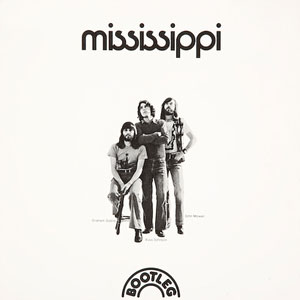
"All Through the Day"
(Goble)
"City Sunday" (Russ Johnson)
"Day Job Song" (Goble)
"Do I?" (Johnson)
"Feel Alone" (Goble)
"Kings of the World" (Goble)
"Mr Moondog" (Johnson)
"Save the Land" (Johnson)
"Sweet World" (Goble)
"Three Days" (Goble)
"When You're Old" (Johnson)
Graeham Goble: Lead & Harmony Vocals, Vocal Arrangements, Acoustic & Electric Guitars
Russ Johnson: Lead & Harmony Vocals, Lead Guitar, Acoustic Guitar
John Mower: Lead Vocal
Bass: Barry Sullivan
Bass, “Day Job Song”: John Gray
Drums: Geoff Cox
Drums, “Day Job Song”: Tea Van Zyl
Flute & Sax: Graeme Lyall
Orchestrations: Peter Jones
Piano: Brian Cadd, Peter Jones
Produced by Peter Jones & Ern Rose
Engineered & Mixed by Ern Rose
The Mississippi album was re-released on CD
by EMI in 2001. It
has a different cover from the original but according to Graeham Goble
it appears to be mastered from the original tapes.
|
References / Links
Ian McFarlane
Encyclopedia of Australian Rock & Pop (Allen
& Unwin, 1999)
Noel McGrath
Encyclopedia of Australian Rock (Outback Press, 1978)
Toby Creswell (ed.)
Love Is In The Air (ABC Books, 2003)
Debbie Kruger
Songwriters Speak: Converstaions about creating music (Limelight Press, 2005)
http://www.debbiekruger.com/songwritersspeak/
Graeham Goble official website
http://www.graehamgoble.com.au
Beeb
Birtles official website
http://www.birtles.com/mississippi/index.html





